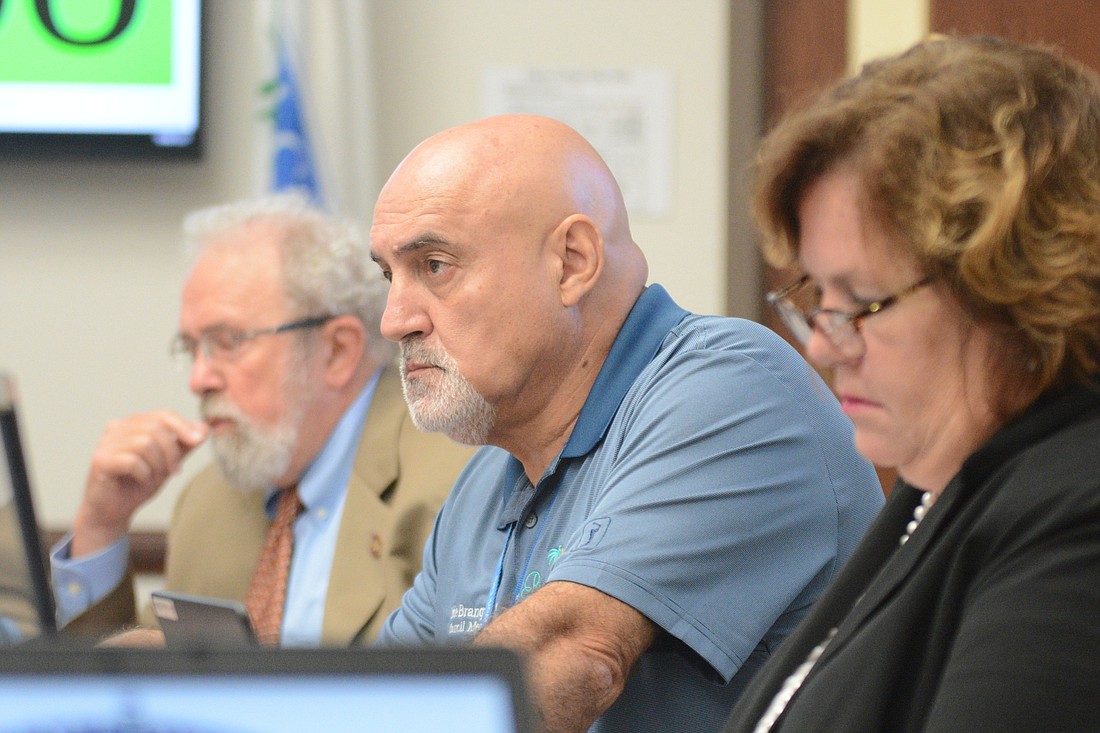- April 18, 2024
-
-
Loading

Loading

Palm Coast's leaders are developing a plan for Florida Park Drive: They want to increase speed limit enforcement, buy air quality monitors to test pollution along the road, test the area for noise, and develop a set of landscaping options residents can use to decrease the traffic's impact on their lives.
Florida Park Drive, at just under two miles long and with a mix of commercial and residential buildings, has spurred resident complaints for years, with a small circle of residents regularly attending City Council meetings to push the council to decrease or slow traffic on the residential parts of the street.
"We have become the default construction route for this entire area, and this will be the case for the Conservatory project and every other project. It just isn’t right. ... Their business should not be our burden."
— MARY KAY HAYWARD, Palm Coast resident
The council previously discussed Florida Park Drive at a workshop on May 28, but Mayor Milissa Holland was not happy with a city staff presentation at that workshop that listed as an option the possibility of taking no action regarding the road. The council told staff to come up with a new set of ideas, and present them at the council's June 11 workshop. Holland was absent on June 11.
The workshop was also new city Traffic Engineer Michael Grunewald's first occasion to address the council: He'd been hired May 29.
In addition to the possibilities the council decided it was interested in, Grunewald and city Stormwater and Engineering Dpepartment Director Carl Cote presented a few more.
The city could, Cote said, add new striping to the entire length of Florida Park Drive. A potion of it is scheduled for repaving this coming year. The striping would be wider than usual, giving the impression of narrower lanes — 9 feet 8 inches wide instead of 10 feet 4 inches wide — and would be accompanied by new reflective markers. Narrower looking lanes slow drivers down, Grunewald said.
"Studies have shown that lanes under 10 foot have a dramatic effect on how aggressive drivers are going to be," Grunewald said.
But it's expensive: $27,000 per mile more for the wider striping than the regular.
And councilman Bob Cuff had a concern. If the city approves that striping for Florida Park Drive, he said, what defense would it have for saying no when residents of other streets began requesting it, too?
Councilman Jack Howell noted that a Publix shopping center is planned for Matanzas Woods Parkway. That, he said, might draw the traffic on northern Florida Park Drive off of the rest of the road anyway, because they'll be able to go north to shop rather than taking Florida Park Drive all the way south to the Island Walk shopping center.
Councilman Eddie Branquinho suggested focusing on emissions.
"If we can do something that maintains the constant speed, that will alleviate all that pollution from the cars," Branquinho said.
Cuff agreed that enforcing the speed limit and keeping the traffic moving smoothly would be a practical option. He was skeptical off the need for air quality monitors or noise monitors, saying he doubted they'd tell the city anything its staff didn't already know.
City staff also proposed that the city could use signage to discourage commercial trucks from using the road as a throughway. It would cost about $18,000. But Grunewald said the information he'd evaluated so far from the city showed only 26 large commercial trucks using the road a day. Of those, some could be heading to work at addresses on the street — for instance, lawn care trucks or various contractor vehicles.
Cuff thought the signage might not be necessary, especially since many of the trucks on Florida Park Drive may not be cut-through traffic, and, therefore, may not be able to avoid using the road.
Howell thought the city should buy air quality sensors. They would cost $24,480, including the initial month of monitoring, and would cost $800 per additional month thereafter. He asked if they could be moved, if needed, to places other than Florida Park Drive, or if they'd be immobile. Cote said they could be moved, with some recalibration. Noise monitoring would be $7,635.
Resident Steve Carr, one of the city's most vocal critics of the current condition of Florida Park Drive, said the city should look into why its estimation of the number of commercial trucks using the road was so low compared to other estimates from the past, and compared to residents' own experience watching the trucks roll by.
Mary Kay Hayward said she lives about halfway along the length of Florida Park Drive, near Flynn Way.
One morning, she sad, there were "seven noisy, rattling trucks by 7 a.m. ... and that really does ruin that first cup of coffee.”
She submitted for city staff a powerpoint presentation filled with photos, taken from a home surveillance camera, of heavy trucks rumbling along the narrow residential street.
The design of the roadway, she said, was ITT's "original sin that has truly turned into a monster. ... We have become the default construction route for this entire area, and this will be the case for the Conservatory project and every other project. It just isn’t right. ... Their business should not be our burden."
The council decided against spending an additional $48,375 for another traffic study by the Lassiter Transportation Group.